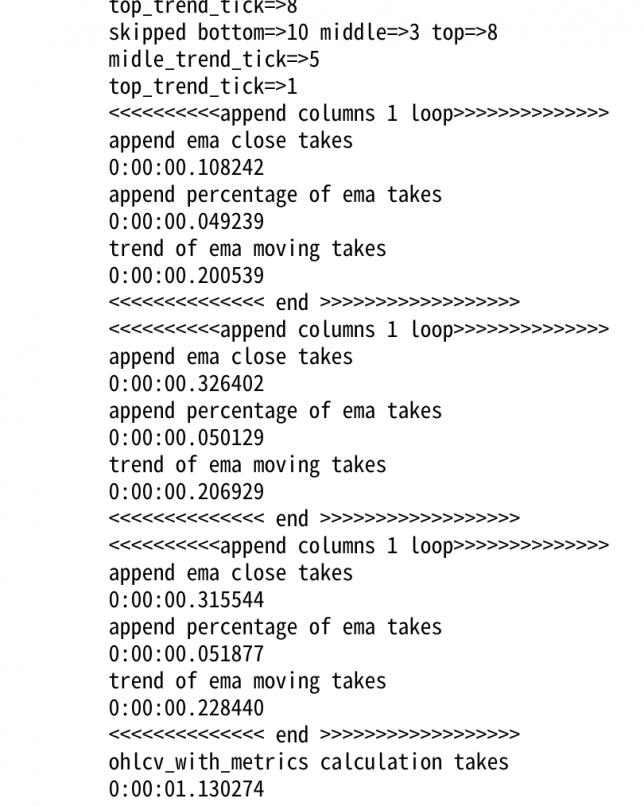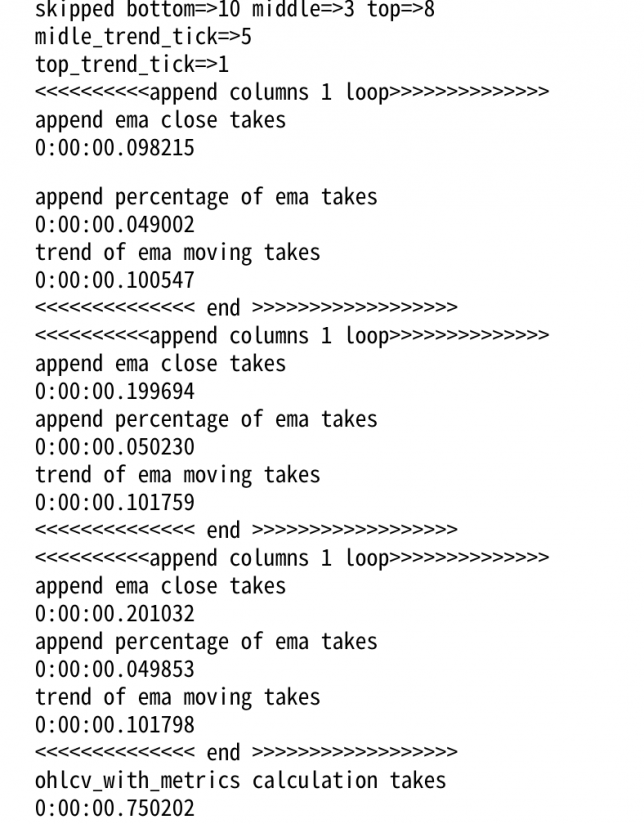Pandasの列の追加を倍速にした話
Pandasの列の追加を高速化した話です。pandasで1000万件のデータの前処理を高速にするTips集を多分に多分に参考にしています。
ありがとうございます。
以下の修正前のコードの1ループでは、おおよそ数百〜数千行のDataFrameに対して、ema_15のような列を追加しています。
修正前の方法はpandasで1000万件のデータの前処理を高速にするTips集の1章の方法2にあたります。
目次
修正前
修正前のコード
for tick in list(self.specific_params.values()):
col = "ema_" + str(tick)
diff_col = col + "_diff"
trend_col = col + "_trend"
ohlcv_with_metrics[col] = ta_ema.append_ema_close(tick)
# percentage of ema moving
ohlcv_with_metrics[diff_col] = ohlcv_with_metrics[col].diff() / \
ohlcv_with_metrics[col] * 100
# trend of ema moving(ここから下の部分をmapを使うように変更する)
ohlcv_with_metrics.loc[(ohlcv_with_metrics[diff_col] > 0),
trend_col] = "uptrend"
ohlcv_with_metrics.loc[~(ohlcv_with_metrics[diff_col] > 0),
trend_col] = "downtrend"
修正前の結果

修正前の箇所で注目してほしいのはtrend of ema moving takesの真下の実行時間です。
上から順に
0.200539秒
0.206929秒
0.228440秒
かかっていますね。
修正後
修正後のコード
for tick in list(self.specific_params.values()):
print("<<<<<<<<<>>>>>>>>>>>>>")
col = "ema_" + str(tick)
diff_col = col + "_diff"
trend_col = col + "_trend"
ohlcv_with_metrics[col] = ta_ema.append_ema_close(tick)
print("append ema close takes")
print(datetime.now() - exec_start_time)
exec_start_time = datetime.now()
# percentage of ema moving
ohlcv_with_metrics[diff_col] = ohlcv_with_metrics[col].diff() / \
ohlcv_with_metrics[col] * 100
print("append percentage of ema takes")
print(datetime.now() - exec_start_time)
exec_start_time = datetime.now()
# trend of ema moving(ここから下の部分が変更箇所)
ohlcv_with_metrics.loc[:, trend_col] = ohlcv_with_metrics[diff_col].map(
self.create_trend_col)
print("trend of ema moving takes")
print(datetime.now() - exec_start_time)
print("<<<<<<<<<<<<<< end >>>>>>>>>>>>>>>>>>")
return ohlcv_with_metrics
def create_trend_col(self, diff):
if diff > 0:
return "uptrend"
else:
return "downtrend"
trend_colを追加する際にmap関数を使うように変更しています。
map関数は先程の”uptrend”か”downtrend”かを判定するだけのメソッドで、最初のコードから切り出しています。
修正後の結果

修正後の実行時間は上から順に
0.100547秒
0.101759秒
0.101798秒
と倍速になっていることがわかりますね!めでたしめでたし!
参考


コメント